USDA Under Secretary Visits Youth-Oriented Extension Programs
go.ncsu.edu/readext?1029886
en Español / em Português
El inglés es el idioma de control de esta página. En la medida en que haya algún conflicto entre la traducción al inglés y la traducción, el inglés prevalece.
Al hacer clic en el enlace de traducción se activa un servicio de traducción gratuito para convertir la página al español. Al igual que con cualquier traducción por Internet, la conversión no es sensible al contexto y puede que no traduzca el texto en su significado original. NC State Extension no garantiza la exactitud del texto traducido. Por favor, tenga en cuenta que algunas aplicaciones y/o servicios pueden no funcionar como se espera cuando se traducen.
Português
Inglês é o idioma de controle desta página. Na medida que haja algum conflito entre o texto original em Inglês e a tradução, o Inglês prevalece.
Ao clicar no link de tradução, um serviço gratuito de tradução será ativado para converter a página para o Português. Como em qualquer tradução pela internet, a conversão não é sensivel ao contexto e pode não ocorrer a tradução para o significado orginal. O serviço de Extensão da Carolina do Norte (NC State Extension) não garante a exatidão do texto traduzido. Por favor, observe que algumas funções ou serviços podem não funcionar como esperado após a tradução.
English
English is the controlling language of this page. To the extent there is any conflict between the English text and the translation, English controls.
Clicking on the translation link activates a free translation service to convert the page to Spanish. As with any Internet translation, the conversion is not context-sensitive and may not translate the text to its original meaning. NC State Extension does not guarantee the accuracy of the translated text. Please note that some applications and/or services may not function as expected when translated.
Collapse ▲It is harvest time at Shady Brook Elementary School in Kannapolis. Fourth-grade students enthusiastically grab trowels and begin digging up sweetpotatoes they planted in May as third-graders.
It’s an annual event at not just Shady Brook but at all eight schools of the Kannapolis City Schools. The students are participants in school garden programs supported by NC State Extension experts Doug Vernon and Amy Bowman.
There is something extra special about this one, though. Today the students are joined by a member of the United State government.
Chavonda Jacobs-Young, the United States Department of Agriculture’s Chief Scientist and Under Secretary for Research, Education, and Economics, is getting her hands dirty too. Much of her professional life might be spent in meetings or making important decisions that impact the future of farming in the country, but today she is having fun digging in the dirt.
“I love the kids,” she said. “It was so much fun to see them so excited.”
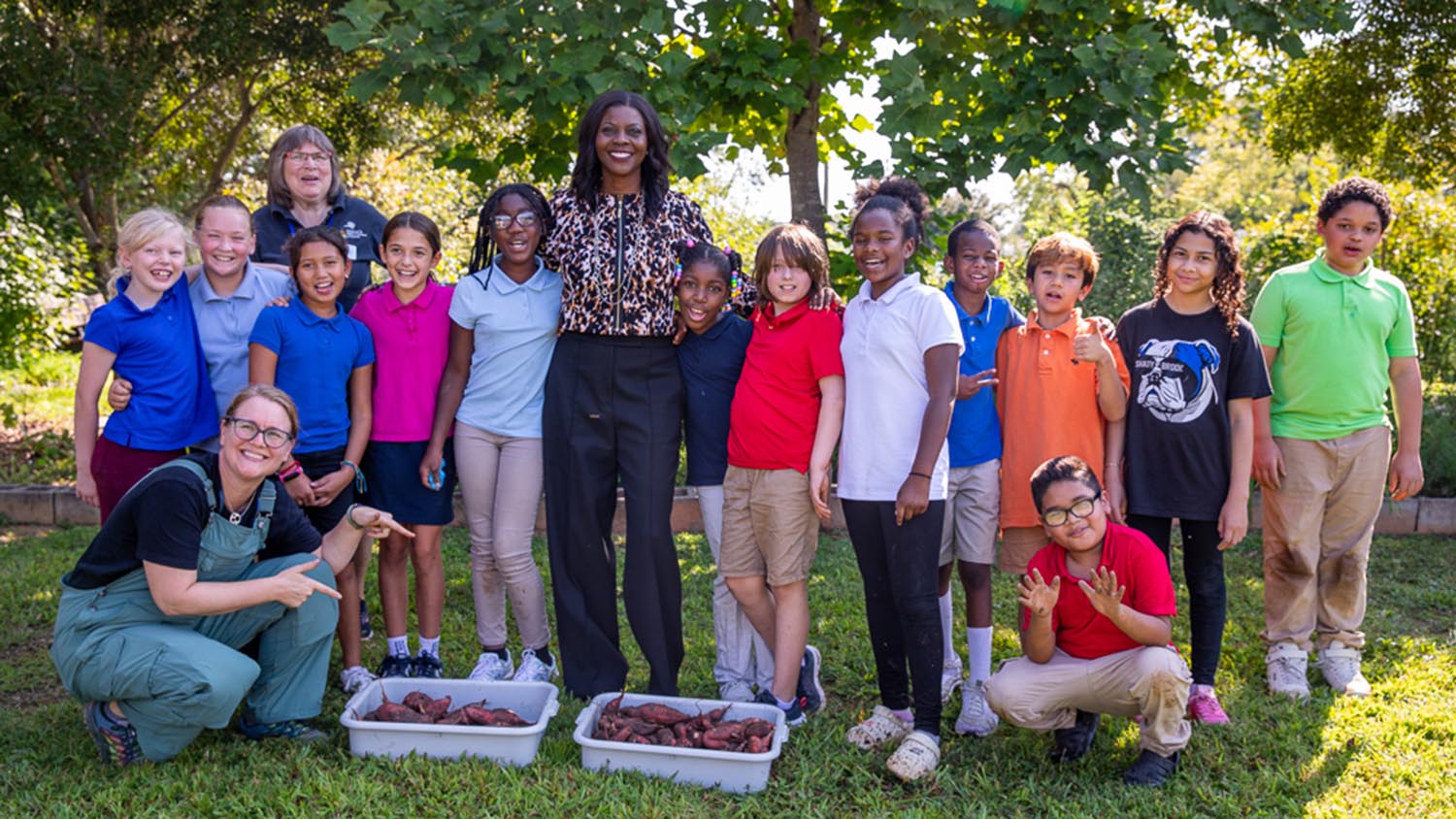
USDA Under Secretary Chavonda Jacobs-Young with students and teachers at Shady Brook Elementary after harvesting sweetpotatoes. NC State Extension experts at the Plants for Human Health Institute support school garden programs at every school in Kannapolis.
Jacobs-Young, who holds three degrees from NC State’s College of Natural Resources, was in Kannapolis to learn about the cutting-edge research taking place at NC State’s Plants for Human Health Institute (PHHI).
Related: USDA Under Secretary Visits Veteran Farmer Registered Apprenticeship Program
The institute, located on the North Carolina Research Campus, is a global leader in plant and food innovations for disease prevention and health benefits. NC State College of Agriculture and Life Sciences (CALS) research faculty explore plant-based strategies for improving human health.
Jacobs-Young toured labs and met researchers at PHHI, learning about their work in disease prevention and health maintenance through plants.
“There were some amazing opportunities for partnership around how we can better integrate food and nutrition with better health,” she said. “Some of the food innovation labs that we saw today, some of the high-tech science that is being conducted, is making sure that we continue to learn more about the healthful nature of the foods we eat.”
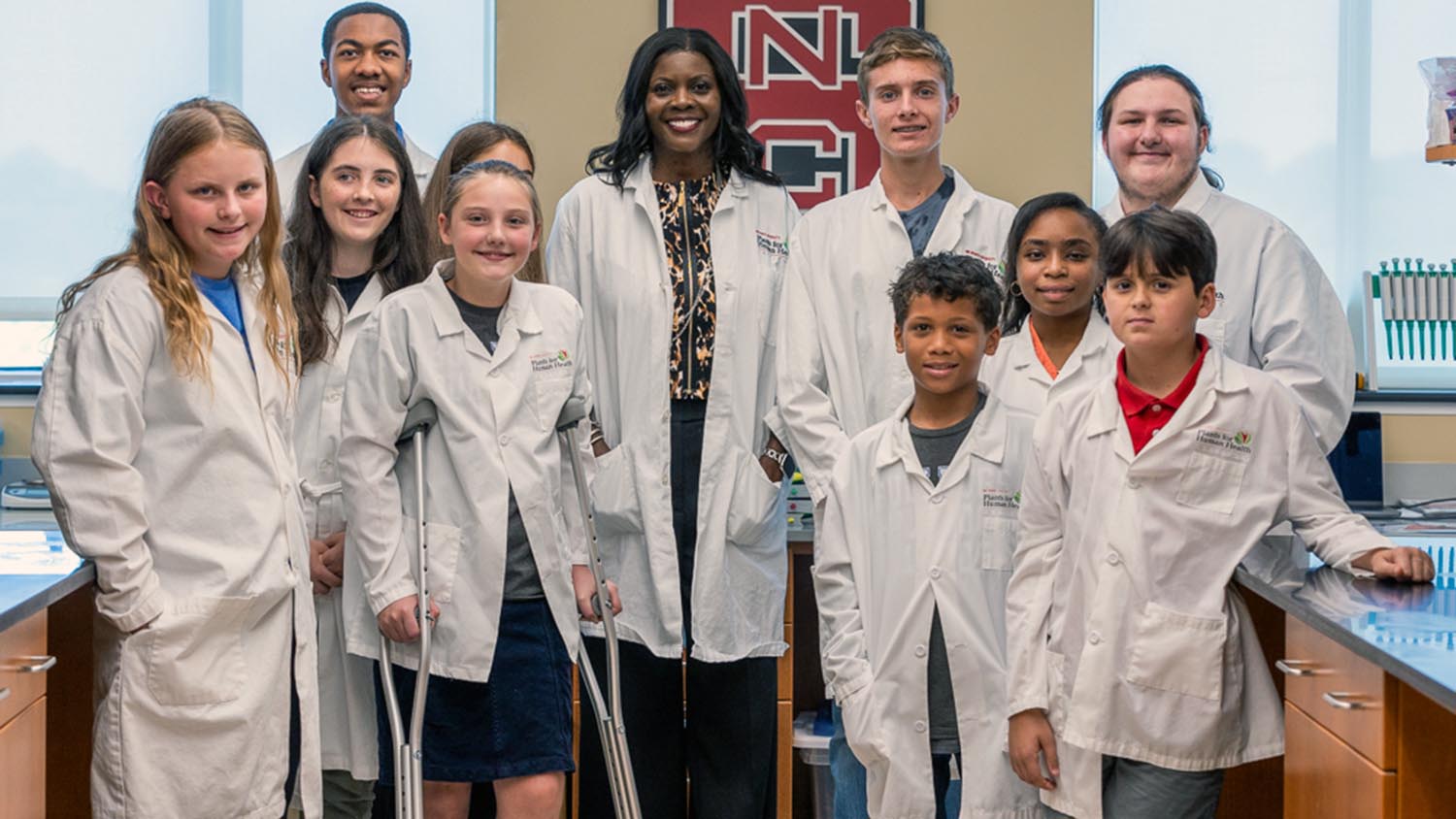
Students from the Scientist for a Day program had the opportunity to meet USDA Under Secretary Chavonda Jacobs-Young. Program participants spend a day at the STEM training lab at PHHI where they meet researchers and conduct hands-on experiments.
NC State’s status as a land-grant university and its well-earned reputation for helping the people of the state through the Extension system are major factors that make the university and PHHI attractive for future collaborations.
“We partner with organizations that people trust,” Jacobs-Young said. “They do trust their land-grant university. In the Agricultural Research Service alone we put out some 3,000-4,000 peer-reviewed publications a year. So how do you turn that into information that people can use? By partnering with people they trust. It’s important to get more people to adopt what we know is important to helping us live longer lives. Bad health leads to lack of longevity. We know better. We should do better.”
NC State Extension is the mechanism for getting research-based information into the hands of people across the state. While at PHHI, Jacobs-Young learned about the work conducted by Extension experts. That includes Cheri Granillo’s phytomedicine program, which encourages medical professionals to prescribe healthy fruits and vegetables for disease mitigation, and the school garden and Scientist for a Day programs conducted by Vernon and Bowman.
Related: A Prescription for Plants
The school gardens are operated in conjunction with STEM (science, technology, engineering and math) teachers, including Meredith Katz at Shady Brook.
“Agriculture is science,” Katz said. “My favorite part of the job is taking the kids outside. The sense of wonder and the excitement they get is wonderful. Having those experiences helps them realize that learning isn’t just inside the four walls of the classroom. It’s everywhere in all walks of life.”
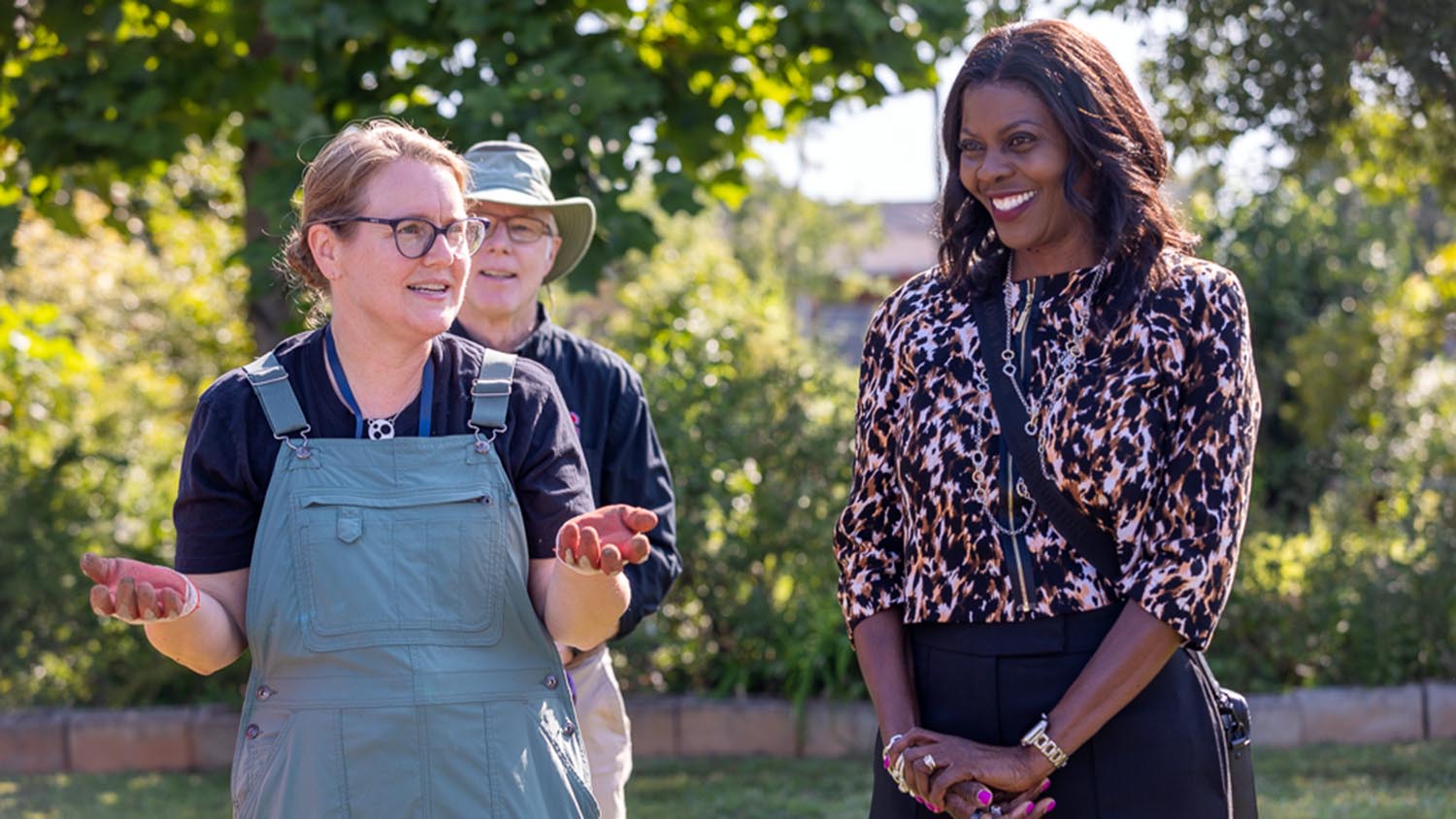
Shady Brook Elementary STEM teacher Meredith Katz and NC State Extension assistant Doug Vernon tell USDA Under Secretary Chavonda Jacobs-Young about the school garden program.
They also learn important lessons about the source of their food and healthy eating.
“We present to the K-12 audience in a way that they can understand it,” said Vernon, who was a high school ag teacher before joining Extension. “We teach them an awareness of North Carolina agriculture. In the long run, these students, even if they never garden again, if they don’t get involved in agriculture, will be better consumers. They’ll be better in their pursuit of food at farmers markets and stores.”
In addition to eight schools in Kannapolis, Vernon and Bowman support gardens in 20 of the 22 schools in Cabarrus County. They also deliver workshops across the country and offer an online course called Building Gardens, Building Minds.
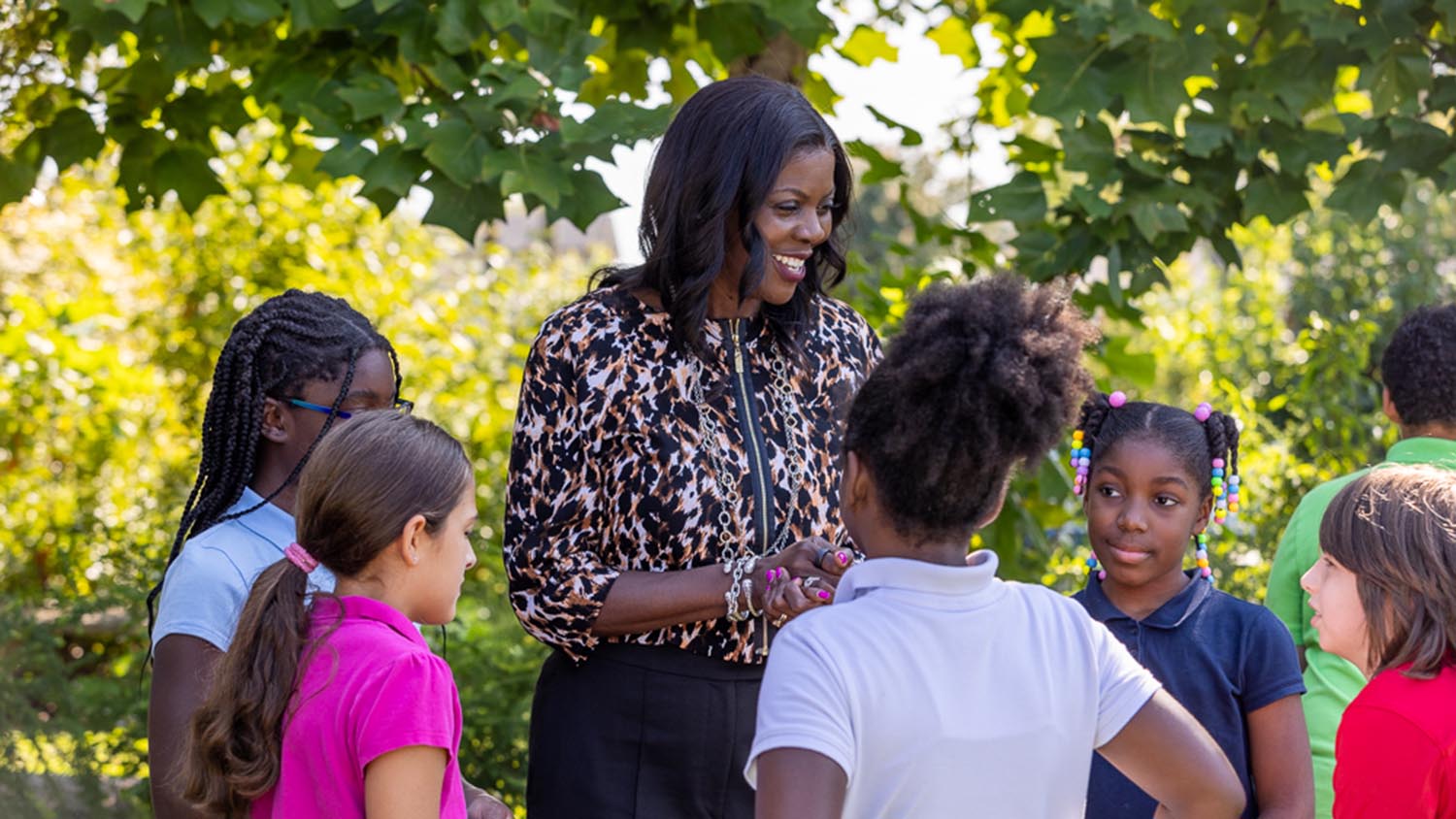
USDA Under Secretary Chavonda Jacobs-Young talks with students participating in an NC State Extension school gardens program in Kannapolis.
Vernon and Bowman work with the schools to provide sweetpotato slips from the NC State Micropropagation and Repository Unit (MPRU). The collaboration began five years ago when Christie Almeyda, MPRU director, was a guest speaker at the School Garden Summer Institute.
“The curriculum focus may be math or even social studies, but they’re learning gardening too,” Vernon said. “Research shows that if a person grows it, they’re far more likely to eat it. If kids are doing that at a young age then they’ve got a habit formed. That and understanding the connection between the food you eat and health, and understanding how we can make lifestyle changes that can impact that.”
The students who participate in the Scientist for a Day program are selected by their teachers based on an enthusiasm for science. They spend a day in the STEM training lab at PHHI where they meet researchers and have an opportunity to conduct hands-on experiments.
“We really try to make students feel like they’re scientists,” said Bowman, who also conducts tours with hands-on activities for school field trips and 4-H groups. “We have lab coats and all the instruments for them to be able to do benchtop work based on the research we do here.”
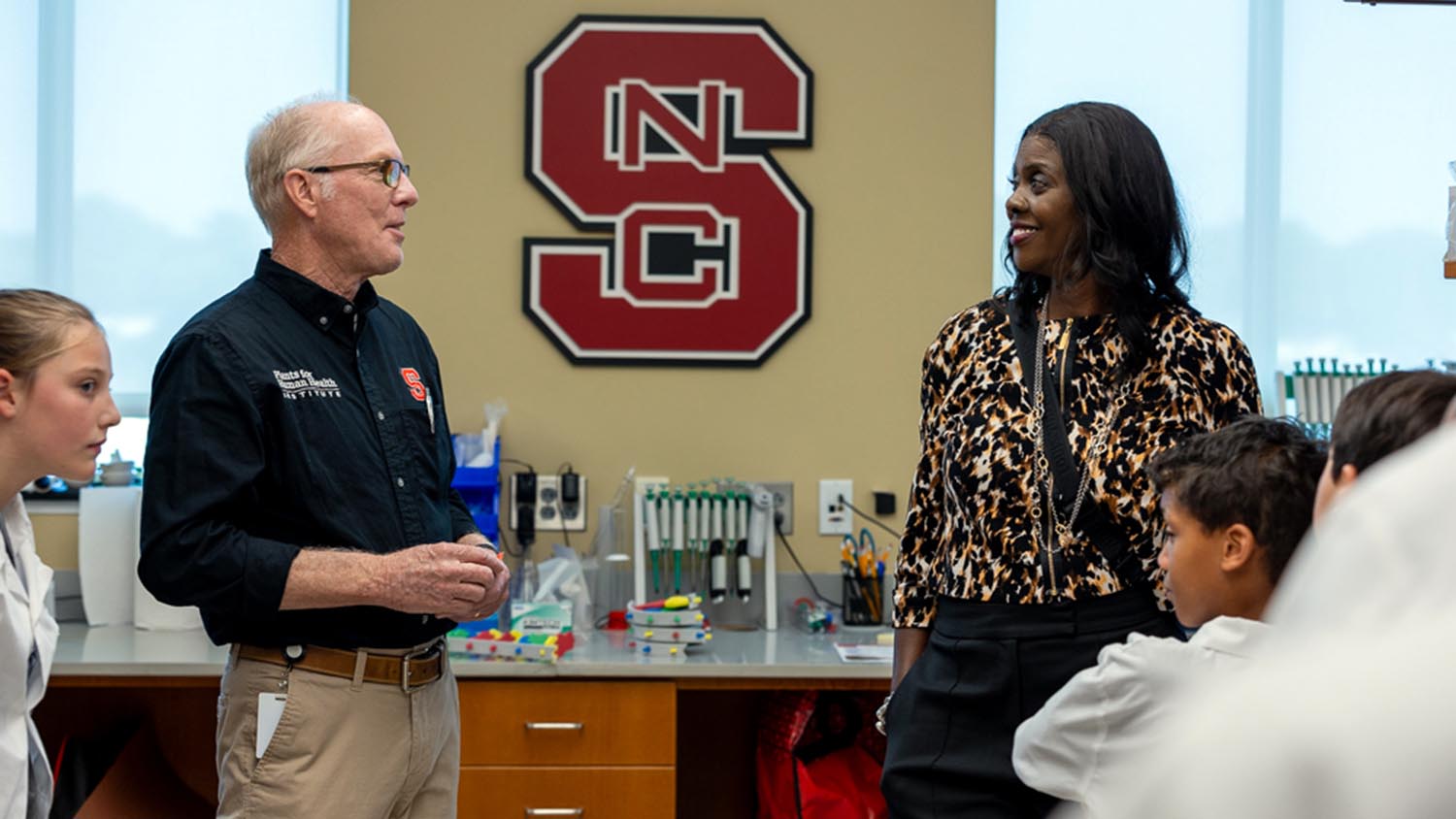
Doug Vernon tells USDA Under Secretary Chavonda Jacobs-Young about the Scientist for a Day program at NC State’s Plants for Human Health Institute in Kannapolis.
That includes extracting DNA from strawberries, refractometer measurements with fruits and vegetables, micropipetting, and electrophoresis.
“We live in an area where when people think about future success, they think about football and basketball. Some of them are thinking about college, but science is not a tangible concept for them,” said Bernard Waugh, principal at Shady Brook. “And then they go to the research campus that’s right here in Kannapolis and they do these things like extract strawberry DNA. It adds some tangibility to the idea that science is something they could pursue and get involved in and can really ignite a fire.”
Jacobs-Young had the opportunity to interact with students who had participated in the program during her visit, including an elementary-school aged student who professed his love for science.
“Ever since I was 2 or 3 I loved to go around my pond looking for frogs so I could study them,” he said. “I’ve just always wanted to be like this tiny little scientist.”
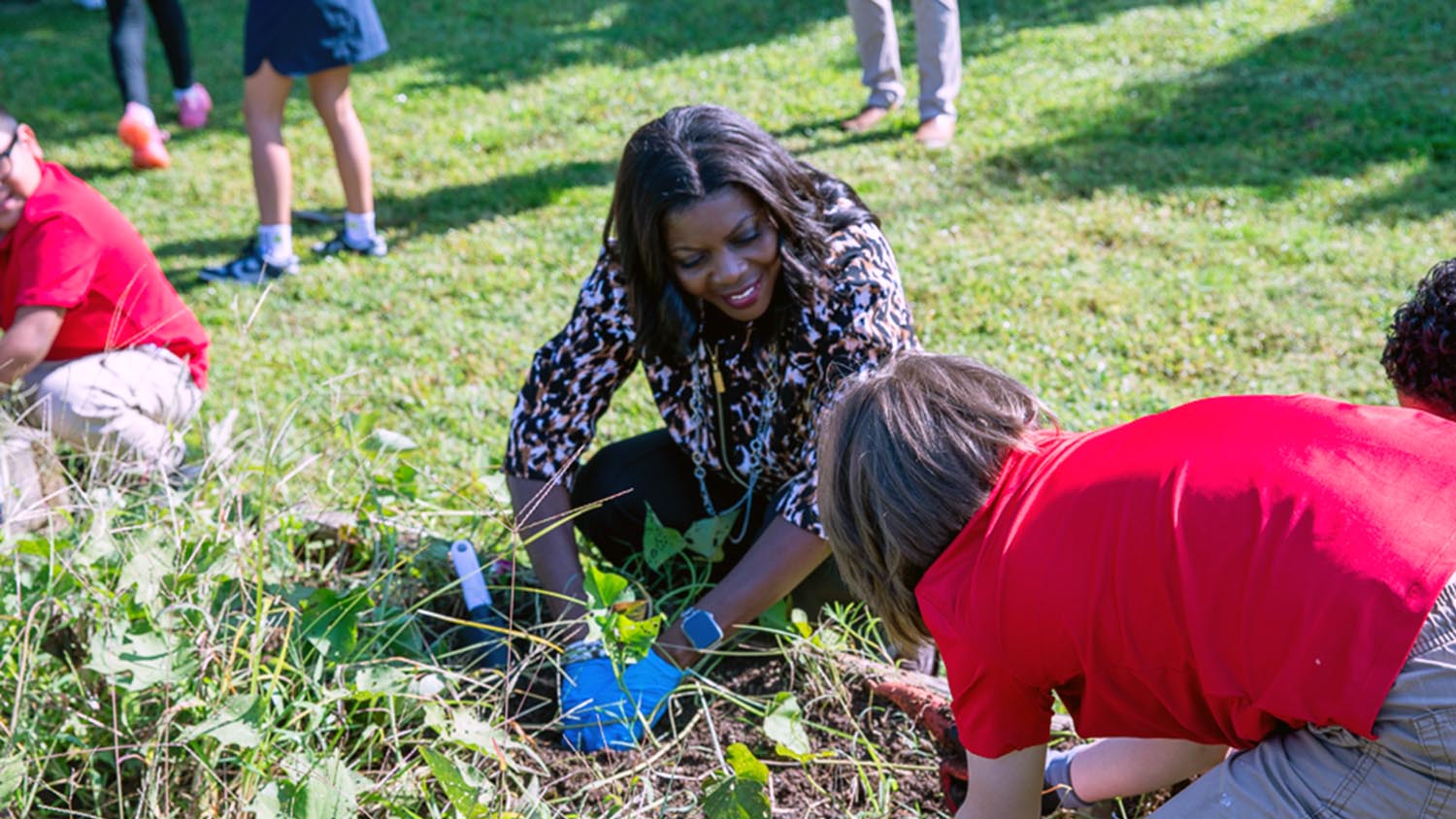
USDA Under Secretary Chavonda Jacobs-Young helps harvest sweetpotatoes at Shady Brook Elementary. The school garden is supported by Extension experts at NC State’s Plants for Human Health Institute in Kannapolis.
Jacobs-Young encouraged him to keep up his interests, while giving a plug for her alma mater.
“Now I’m not sure about the study of frogs, but we need people like you in agriculture because we want to keep the animals healthy,” she said. “We want to make sure that the cows and the pigs and the chickens are kept very healthy and we’re always fighting against some disease that is trying to threaten us in agriculture. So stay in science. Remember that NC State has a wonderful veterinary school program.”
A high school student told Jacobs-Young she has “always been obsessed with science.”
“When I was little, I started out looking at space and then my attention shifted to wanting to know more about infectious diseases because of the Covid pandemic,” she said. “I want to go into epidemiology.”
Jacobs-Young said she could have a career in agriculture.
“We have a lot of epidemiologists in agriculture,” she said. “There’s a pandemic we’re dealing with right now for animal science called high path avian influenza.”
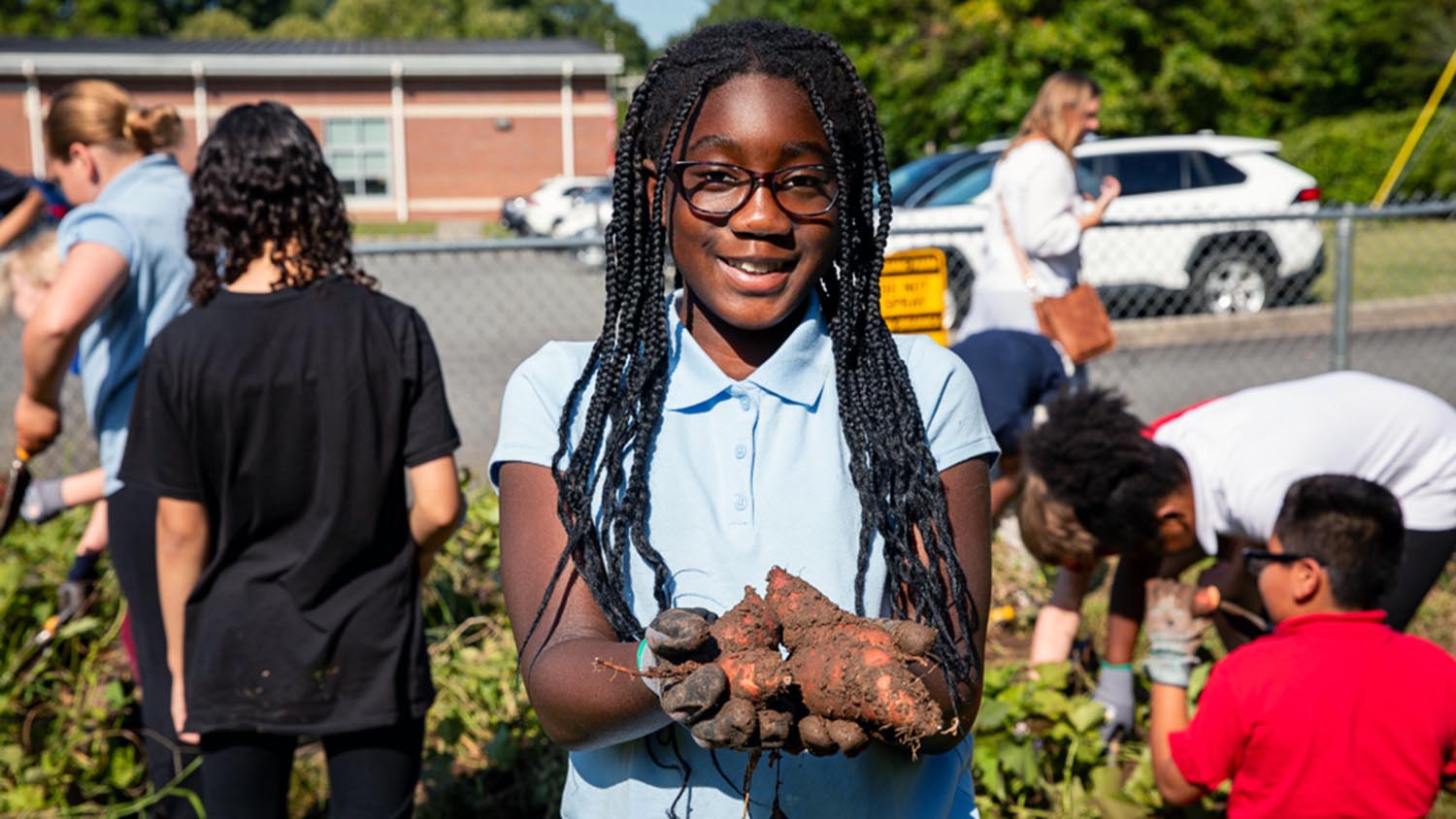
A fourth-grader at Shady Brook Elementary displays sweetpotatoes harvested from the school’s garden. Students learn important lessons about the source of their food and healthy eating from the school garden program supported by NC State Extension experts at the Plants for Human Health Institute in Kannapolis.
The trip to Kannapolis began with digging in the dirt with students. It ended with conversations with young people enthusiastic about science who might consider careers in agriculture.
“I know for sure that we now have a cadre of young people who know where their food comes from, and they’re excited about eating it,” Jacobs-Young said. “We need to encourage young people to work in agriculture. That’s why I’m excited about the programs here. It was just a great day and it’s a good, hopeful signal that we’re on the right path.”

